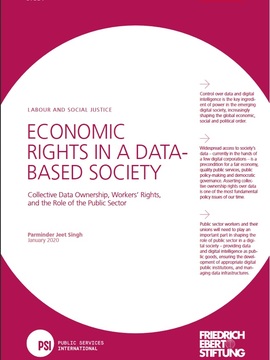Winning a world where digitalisation serves workers and our communities.

Kate Lappin
Building Our Digital Future Digitalisation
Winning a digital world that works for workers
It's time to shape our own digital future, based on workers' rights public services which are digitally democratic, inclusive and of high quality for all.
Resources on Digitalisation for Unions
We've created a series of useful tools to help unions and workers reclaim power over digitalisation in their workplaces and lives.
Teach Forward!
A Facilitator’s Guide to "Our Digital Future"
This online interactive Guide to digitalisation contains a series of workshops, each based around ideas and resources developed during the course of PSI's "Our Digital Future" project.
It has everything you need to empower colleagues and members to engage on digitization issues. It includes many of the other materials, listed under the headings below.
Click a heading below to access our tools across key themes:
Understanding Digitalisation
Worker friendly information to help you understand digitalisation and its effects on workers.
(Click title to download/access)
Report | Title | Description |
| This report provides an overview of how digitalization is affecting public service delivery, quality and access, employment conditions and labour rights worldwide. It examines how unions are responding to these changes and identifies how regulation and governance can be used to promote an equitable future of work. | |
 | Digitalization: A Union Action Guide For Public Services, Work and Workers | This online report helps understand how digitalization is affecting unions and members. Each chapter includes recommendations for union action. |
| Digital trade rules and Big Tech: Surrendering public good to private power | This report documents the risks associated with e-commerce and digital trade and outlines the importance of effective regulation. It concludes with recommendations for trade unions. |
| This report outlines the important role that public service unions must play in advocating for data and digital intelligence as public goods, ensuring the development of appropriate digital public institutions, and managing data infrastructures. | |
| This report highlights key trends in the digitalization of public services, including the development of smart cities, public utilities, public service employment, and the impact that Covid-19 has had on all of these issues. | |
 | DROs are union members who have been comprehensively trained in PSI’s Our Digital Future project. These regional networks provide support, ideas and strategies on digitalisation of work and workers. Translated material of the DRO training material is available | |
| Report on how Micosoft lobbies for major government tech contracts while using offshore companies to dodge paying its fair share of taxes. |
Digital Bargaining Hub + Negotiation Tools
Tools that help unions to advocate for workers in the workplace and in policy arenas.
(Click heading to download/access)
Resource | Title | Description |
 | A repository of real-world bargaining clauses, union guidance, and framework agreements related to the digitalization of work and workers. You can adapt and use the hub’s examples in your negotiations. | |
 | A step-by-step guide to help union negotiators and shop stewards identify legal rights and good practices as they negotiate for workers’ collective data rights. | |
 | A guide that provides workers with 21 questions that can be directed at management to ensure that algorithmic systems deployed in workplaces are inclusively governed. | |
 | A guide to assist unions understand how management collects, analyses, stores and shares (or sells) workers’ data. It introduces collective bargaining as a means to protect workers’ fundamental rights and freedoms. |
Assessing Your Union’s Digital Readiness
Strategy development materials to help unions transform responsibly
(Click title to download/access)
Resource | Title | Description |
 | An interactive guide to help unions establish how digitally ready they currently are, and identify organisational, political and strategic areas where union practices can be strengthened. |

Check out our Digital Bargaining Hub!
Access real-world bargaining clauses and analysis to build your strategyBackground and context
Who governs the digital transformation is one of the most important questions of the coming decade: unions must be ready to shape this transformation in the public interest.
When governed well, digital advances can benefit workers, improve public services, break down barriers to access and build democratic power over our data commons.
But if they are geared towards private extraction, digitalisation exacerbates inequality, diminishes labour influence, undermines democracy and gives private corporations control over the most significant stores of information in human history, to use for whatever ends suit them.
If unions are ready to shape the digital transformation in the public interest, there is a huge opportunity to grow labour power, improve public services and win democratic control over our data.
But to do this, we must build an understanding of how the current transformation is being shaped to serve private actors and be ready to effectively challenge their power.
Winning this debate requires developing and effectively communicating a positive, alternative model and vision, where digital transformation is publicly governed and shaped for the collective good.
The key questions are not about the technologies themselves, but how they are implemented, by whom and for what purpose. This has deep implications for reshaping power relations between capital and labour.

PSI's Digitalisation Project - Our Digital Future
This three year project is designed to equip union leaders members and activists with the skills needed to shape the digitalisation debate
Find out more and get involved!The Post-Pandemic digital era
COVID-19 has all too clearly shown how digital tools have become an integral part of our work and societies.
In the public sector, workers are faced with increased surveillance and monitoring as employers try to mitigate the “risks” of remote workers.
Public authorities and agencies are mobilising quickly to put new e-systems in place to keep people safe. But this increased pace of digital transformation of the public sector is blurring the boundaries, responsibilities and power dynamics between public and private actors.
While our economies have plummeted, the stocks of Apple, Amazon, Alphabet, Microsoft and Facebook, who own of much of the technology we use, rose 37% in the first seven months of 2020 alone.
These digital giants now hold an unprecedented level of power and influence over our governments - and our lives.
Winning a digital world that works for workers
This is not the first time that workers and unions have had to grapple with the rapid introduction of new technology.
We know that when workers are not involved in the transformation, this leads to:
Cost cutting and job losses
Less responsive and accessible public services
More precarious and informal work and de-unionisation
Facilitating privatisation and create dependency of public institutions on private digital technology providers
Increased surveillance and control of workers in the workplace and work intensification leading to health and safety risks
PSI's engagement on digitalisation is centered on presenting an alternative to this approach, where digital change serves the public interest.
We avoid arguing about the technologies, instead analysing whose interests are currently being served and how to reshape digital transformations in ways which benefit workers and society.
This requires demanding that unions are involved in all digital transformation be it at national, regional, local or sectoral level. And it requires making sure our governments put the long-term interests of their people above a blind faith in the miracles of digital technology.
The digital transformation will demand much of us as public services unions.
We too must have the foresight and courage to change.
It's time to shape our own digital future, based on public services which are digitally democratic, inclusive and of high quality for all.
Key Figures
$138b
current value
of the Big-Data Market
2314
billion gigabytes of global health-data
much of it owned and governed by private corporations
37%
rise in share price
for US Digital Giants during pandemic

Digitalisation: A Union Action Guide For Public Services, Work and Workers
What are the issues public service unions face, actions we can take and resources available
Read the publicationCollective Data Rights and the Datafied State
Data is now one of the world's most valuable resources, yet few governments have developed policies or institutions to ensure data can be utilised for public good. Furthermore, unlike natural resources, data is generated by the collective work of users and workers who have handed over the rights this resource without adequate compensation.
This data only has value in its aggregated form, giving it the property of a natural monopoly with all the associated economic, social and political problems that such monopolies bring. In fact many forms of data should be seen as a public good and collective resource of the community that created it - much like mineral resources are the collective resources of the nation whose land it lies under.
Many private companies - such as the digital giants - now hold monopolies on the data governments need to operate critical public services, and many governments are handing over the rights to these data to companies without understanding its value.
Many forms of data should be seen as a public good
Google Maps and Uber hold essential data on city traffic flows, genome mapping companies are collecting massive databases on DNA sequencing required to develop future medicines and Facebook can influence election results with essentially no regulatory oversight.
Data can be a powerful tool for improving public services and outcomes for workers and our communities. Yet rights to our collective data and governance rules regarding its use and abuse are poorly developed across the world. This is not coincidental - it is the result of heavy industry lobbying.
Unions must quickly build our capacity to challenge this power by arguing for stronger protections and collective data rights if we are to shape the digital transformation which the pandemic has already sped up.
Rosa Pavanelli Public Services International

Increasing precarious work is usually the result of corporations flouting labour rules rather than new technological development.




